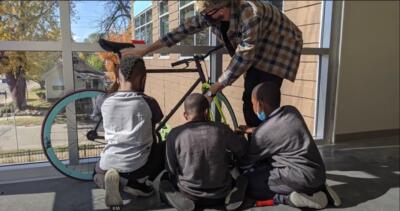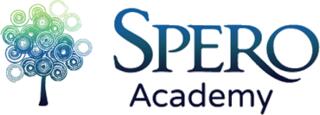
It’s Spring Time at Spero Academy, and that means a number of things: Spring Break for students and teachers. Resetting every clock in the building for Daylight Saving Time. And of course, the Minnesota Association of Charter Schools annual Day at the Capitol.
MACS Day at the Capitol takes place each year during the Minnesota Legislative Session, which begins in January and runs through May. Spero Academy has been a proud participant for the last three years and while this year looked a bit different due to social distancing requirements, Spero was there!
On Wednesday, March 03, Spero Academy Leadership attended a Virtual Day at the Capitol. Spero was one of forty-two schools to meet with lawmakers to discuss legislative measures that our leaders and educators believe are imperative for continued success. Here are a few of the items we brought to the table:
Special Education Funding: The Life Force of Personalized, Adaptive Education
There is no denying that Special Education Funding is critical to Spero Academy's unique programming model and our commitment to personalized and adaptive education. We believe that every child can learn, grow, and succeed when given the opportunity to reach their individual potential.
.JPG?mask=2)
Admittedly, this is a rather ambitious claim. Providing this support is a highly collaborative effort, involving a team of licensed special education teachers, school specialists, and paraprofessional staff. Our paraprofessionals constitute the largest percentage of Spero staff and are crucial to our mission. Nationwide, paraprofessionals constitute thirteen percent of the educational workforce yet there are generally fewer professional development opportunities available to them than for their licensed colleagues. We believe this disparity in staff development is out of step, given the historic, current, and growing importance of paraprofessional contributions to educational outcomes. For this reason, paid paraprofessional development was one of the things on this year’s Day at Capitol agenda.
Paraprofessional Development: Growing the Backbone of Special Education

Special Education teachers and students have long been aware of the invaluable support provided by paraprofessional staff. But the educational challenges created by the COVID-19 Public Health Emergency have revealed, on a much broader scale, the necessity of quality individualized support for students with complex needs and varying levels of ability to access their education outside of the Special Education classroom. A recent study suggests that paraprofessionals also have a direct effect on student test scores and overall proficiency rates. To sustain this indispensable service and the skilled professionals who provide it, we must ensure that training and development opportunities are available to all Spero staff and that they are compensated accordingly for their time and work.
paraprofessional staff. But the educational challenges created by the COVID-19 Public Health Emergency have revealed, on a much broader scale, the necessity of quality individualized support for students with complex needs and varying levels of ability to access their education outside of the Special Education classroom. A recent study suggests that paraprofessionals also have a direct effect on student test scores and overall proficiency rates. To sustain this indispensable service and the skilled professionals who provide it, we must ensure that training and development opportunities are available to all Spero staff and that they are compensated accordingly for their time and work.
%20(4).jpg?mask=2) Who is empowered to succeed among educators and educational leaders has a direct impact on who succeeds among students. The importance of diversity and representation cannot be overstated with regard to individual student outcomes, nor can the importance of equity be overstated in the endeavor to cultivate a more diverse and broadly representative workforce. Providing more paid professional development opportunities is a critical step in creating equitable access to the training, teaching, and guidance needed to advance within education. One of the ways to fund these opportunities is through Grow Your Own (GYO) programs.
Who is empowered to succeed among educators and educational leaders has a direct impact on who succeeds among students. The importance of diversity and representation cannot be overstated with regard to individual student outcomes, nor can the importance of equity be overstated in the endeavor to cultivate a more diverse and broadly representative workforce. Providing more paid professional development opportunities is a critical step in creating equitable access to the training, teaching, and guidance needed to advance within education. One of the ways to fund these opportunities is through Grow Your Own (GYO) programs.
What Does it Mean to "Grow Your Own?"
We speak often of our process for developing educators from within, through onsite mentorship and professional development. Grow Your Own (GYO) programs enable schools to partner with teacher preparatory programs to provide more substantial professional development and teacher training through state funded grant opportunities. With nation-wide teacher shortages following the COVID-19 Public Health Emergency, many schools are turning to the GYO model in an effort to replenish their workforce from within.
The primary objective of GYO programs is to increase the diversity of educators. This objective is in step with an important piece of legislation that came before the House Education Policy Committee during this year’s legislative session. There is a new bill (HF 217) aimed at strengthening the previously proposed Increase Teachers of Color Act, which was introduced in 2019 and again in 2020. This bill contains provisions developed by educators, students, families, and various members of the community, including new and unambiguous terminology, defining important concepts such as institutional racism, culturally sustaining practices, and anti-racist policies, practices, and structures.
HF 217 went before the Education Policy Committee in January, where it passed with most members voting along party lines, and now sits before the House Education Finance Committee.
In a letter to members of this Committee, stressing the gravity of this legislation, Eugene Piccolo expressed the need to “recognize and eliminate historical barriers to equitable educational opportunities.” This is identified as a first step in creating equity in public education with vital measures to follow in the areas of school policy revision, reformation of organizational structure, practices, and attitudes. .jpg?mask=2)
Here in Minnesota, the conspicuous racial disparity between teachers and students seems to be growing. The lack of diversity among educators has the potential to hinder all students academically, socially, and emotionally, but the risk is especially present for students who are black, indigenous, or people of color (BIPOC). If we are to deliver on the promise of providing personalized adaptive education that helps students to grow in each of these ways, the risk must be mitigated through intentional strategy.
When we speak about giving each student the opportunity to learn, grow, and succeed, this requires that our programming is accessible, responsive, and empowering to all students. Providing resources and further education to current educators is certainly beneficial and necessary. But the need to reshape the workforce along racial, cultural, and linguistic lines cannot be ignored, nor can the significance of investing in the long term sustainability of these initiatives.
When you invest in teachers, you invest in students. By ensuring fair distribution of resources and opportunities among the workforce of today, you give rise to more equitable outcomes for the workforce of tomorrow.
%20(1).jpeg?mask=4)

